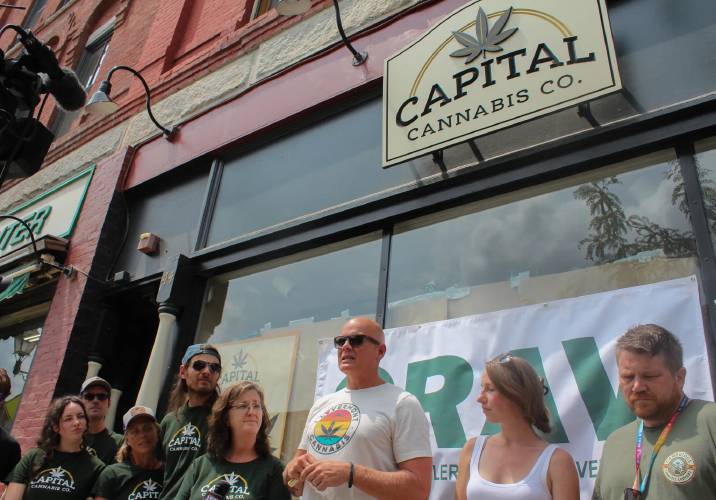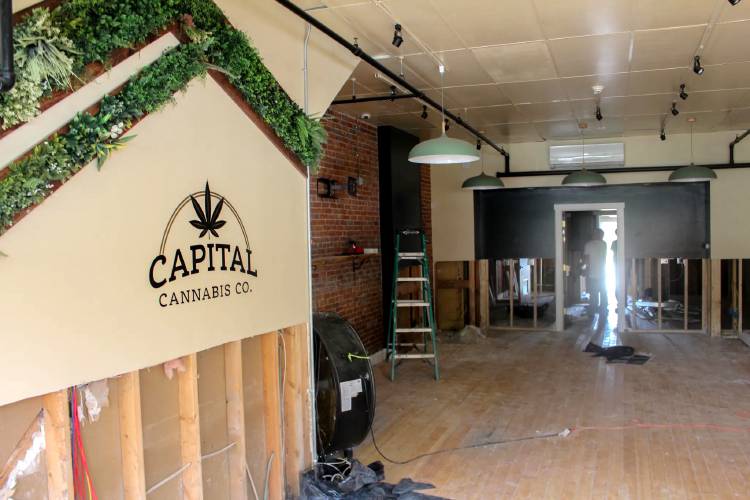Vermont cannabis retailer group rolls out ‘A Higher Calling’ to help relieve industry’s pains
| Published: 07-31-2023 8:19 AM |
MONTPELIER — In front of a newly gutted Capital Cannabis store Tuesday afternoon, the Cannabis Retailers Association of Vermont outlined a plan to raise money for the industry, members of which expect to lose tens of millions of dollars as a result of this month’s historic flooding.
“We don’t have access to federal dollars,” said Todd Bailey, executive director of the association. “So for us, we have to seek very unique alternatives to find that funding. Other businesses do, as well, but they have access to dollars that we simply do not have access to.”
The fundraising effort, unsubtly dubbed “A Higher Calling,” aims to raise money for the state’s only marijuana-dedicated recovery fund. Specialty branded pre-rolled joints, courtesy of flower donations from about a dozen Vermont growers, will be available for a “nominal cost” after a customer donates $15 to the effort. The exact price is yet to be determined as the association irons out final details with the regulatory Cannabis Control Board, Bailey said.
The idea for the pre-roll drive was sparked as Dusty Kenney, owner of Cambridge Cannabis Company, was bailing water out of his dispensary, which sits near the Lamoille River. He hopes that all 57 licensed Vermont cannabis retailers will take part to help underscore the sense of interconnectivity within the field.
Article continues after...
Yesterday's Most Read Articles
“That’s the point of this, right?” he said at the press conference. “The point is that we’re all in this together.”
Bailey also said that “phenomenal bands, national performers” will headline a concert portion of the fundraiser, which is scheduled to take place on Sept. 15 and 16 at Pransky Farm in Cabot. Fifty percent of sales are expected to go directly towards cannabis recovery. The lineup for Friday night and all-day Saturday will be announced “soon,” Bailey said.
Recovery grant funding will be available for members up and down the cannabis industry supply chain starting this fall, according to Bailey.
“Most small businesses fail in the first two years. So we’re not even a year old, we have this disaster, it’s already a struggling small market — there are challenges ahead with any new emerging market,” he said. “So for us, injecting as much cash back into the pockets (of businesses) so they’re not going backwards is really critical.”
Though the effort will infuse some much-needed cash into an industry that remains illegal at the federal level, more help is likely necessary for the myriad businesses that opened just last year. While they can also apply for grant funding through Vermont’s Main Street Flood Recovery Fund, most are waiting to see how last week’s announcement of $20 million in state aid to businesses will be distributed.
The details are expected to be announced this week, according to the Agency of Commerce and Community Development. Members of the Vermont House and Senate’s commerce committees have also scheduled a joint legislative hearing for Thursday during which they’ll hear from those affected by the flooding and others working on recovery.
“I think that’ll answer a lot of our questions around need and availability of funds before we get ahead of ourselves and start calling for … more drastic measures,” Bailey said.
It’s unclear whether lawmakers will convene a special session to address the disaster, nor whether any state aid will be directed to the cannabis industry.
The association’s grant money is expected to help cultivators such as Jesse McFarlin, owner of Old Growth Vermont in St. Johnsbury, who lost an entire field of plants worth $200,000 to this month’s deluge. This was despite efforts in the week leading up to historic rainfall between July 9 and 11 to protect her property, including digging trenches, making swells and putting in French drains, a pipe submerged in gravel that helps naturally drain agricultural plots.
This harsh reality is nothing new for McFarlin and the rest of the industry. Because marijuana operations are also disqualified for federal business loans, which can be beneficial in the early stages of a small business, many are financed through family money or personal savings. This has forced farmers such as McFarlin to work 12 hours a day every day for the past two years, she said.
On the flipside, though, McFarlin said the comparative infancy of the industry has given the relatively small number of businesses operating in it a greater feeling of togetherness and resilience, especially during this period of disaster. Old Growth Vermont is setting aside funds to help other Vermont cannabis businesses and has also been checking in on fellow farmers in the weeks after the flood.
“We’re still able to make donations because if there’s anything we realized as we started this business, it’s that our business is not our own,” she said. “We are dependent on the retailers, on the consumers, on the manufacturers. So if they fail, we fail. We’re all in this together, truly.”



 Colby-Sawyer names interim president
Colby-Sawyer names interim president
